Résultats de recherche de titre
Articles 1495801 à 1495820 sur 1497201
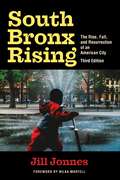
South Bronx Rising: The Rise, Fall, and Resurrection of an American City
Par Jill Jonnes. 2022
Thirty-five years after this landmark of urban history first captured the rise, fall, and rebirth of a once-thriving New York…
City borough—ravaged in the 1970s and ’80s by disinvestment and fires, then heroically revived and rebuilt in the 1990s by community activists—Jill Jonnes returns to chronicle the ongoing revival of the South Bronx. Though now globally renowned as the birthplace of hip-hop, the South Bronx remains America’s poorest urban congressional district. In this new edition, we meet the present generation of activists who are transforming their communities with the arts and greening, notably the restoration of the Bronx River. For better or worse, real estate investors have noticed, setting off new gentrification struggles.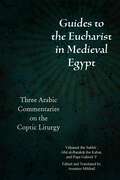
Guides to the Eucharist in Medieval Egypt: Three Arabic Commentaries on the Coptic Liturgy (Christian Arabic Texts in Translation)
Par Yūḥannā Ibn Sabbā‘, Abū al-Barakāt ibn Kabar, Pope Gabriel V of Alexandria. 2022
The fourteenth and fifteenth centuries witnessed a rising interest in Arabic texts describing and explaining the rituals of the Coptic…
Church of Egypt. This book provides readers with an English translation of excerpts from three key texts on the Coptic liturgy by Abū al-Barakāt ibn Kabar, Yūh.annā ibn Sabbā‘, and Pope Gabriel V. With a scholarly introduction to the works, their authors, and the Coptic liturgy, as well as a detailed explanatory apparatus, this volume provides a useful and needed introduction to the worship tradition of Egypt’s Coptic Christians. Presented for the first time in English, these texts provide valuable points of comparison to other liturgical commentaries produced elsewhere in the medieval Christian world.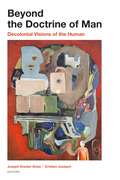
Beyond the Doctrine of Man: Decolonial Visions of the Human
Par Joseph Drexler-Dreis and Kristien Justaert. 2020
Catalyzed by Sylvia Wynter’s questioning of modern/colonial descriptions of the human person, the essays in Beyond the Doctrine of Man…
interrogate the problem of these definitions of the human person and take up the struggle to decolonize and unsettle such descriptions.Contributors: Rufus Burnett Jr., M. Shawn Copeland, Yomaira C. Figueroa, Patrice Haynes, Xhercis Méndez, Andrew Prevot, Mayra Rivera, Linn Marie Tonstad, Alexander G. Weheliye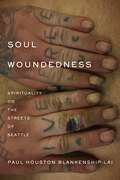
Soul Woundedness: Spirituality on the Streets of Seattle
Par Paul Houston Blankenship-Lai. 2025
A profound exploration into the spiritual beliefs and practices of Seattle’s unhoused youthSoul Woundedness is an intimate, piercing book about…
everyday life for young adults living on the streets of Seattle. Based on over five years of research and as a participant-observer, Paul Houston Blankenship-Lai presents the personal experiences of “street kids,” highlighting how their spiritual beliefs and practices offer them comfort, a sense of community, and a feeling of belonging amidst their struggles. They also demonstrate how spirituality on the streets can alienate people from themselves and the world.The stories Blankenship-Lai tells here are about how social wounds go soul deep, and how seemingly antireligious spiritual practices, fashioned in an almost unlivable local world, help people create a life still worth living. By paying deep, sustained attention to what spirituality is like on the streets and what difference it makes, Blankenship-Lai uncovers an important, overlooked dimension in the experience and study of homelessness. They invite us to enter these stories and to question how our own spiritual and otherwise practices can help create “a more loving love.”Aimed at a diverse audience, Soul Woundedness is a book not merely to educate but to transform. It is particularly relevant for those interested in spirituality’s role in addressing social inequities and underscores the importance of spiritual practices in overcoming adversity and promoting social change, making a compelling case for a world where everyone has a place to call home.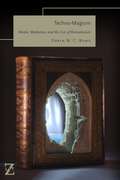
Techno-Magism: Media, Mediation, and the Cut of Romanticism (Lit Z)
Par Orrin N. Wang. 2022
Shortlisted, Marilyn Gaull Book AwardTechno-Magism explores how British Romantic literature abuts and is organized around both print and non-print media.…
The book explores not only the print, pictorial art, and theater of early nineteenth-century England and Europe but also communicative technologies invented after the British Romantic period, such as photography, film, video, and digital screens. This proleptic abutting points to one way we can understand the implicit exceptionality wagered by reading Romanticism through media studies and media theory.Techno-Magism argues that both media studies and the concept of mediation in general can benefit from a more robust confrontation with, or recovery of, the arguments of deconstruction, an unavoidable consequence of thinking about the relationship between Romanticism and media. The book thinks that relationship through the catachrestic practice of a techno-magism, a technics of inscription always outside the causalities of a dialectical economy. The book further pursues two interrelated ideas: the structural incommensurability of the cut and the unapologetic presentism of the constellation. Marked by its late capitalist moment of composition, the book explores the continuity between the social character of Romantic and post-Romantic media, in terms of commodity culture, revolution, and the ecological devastation of the anthropocene.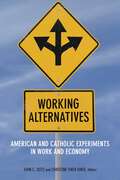
Working Alternatives: American and Catholic Experiments in Work and Economy (Catholic Practice in North America)
Par John C. Seitz, Christine Firer Hinze. 2020
Working Alternatives explores economic life from a humanistic and multidisciplinary perspective, with a particular eye on religions’ implications in practices…
of work, management, supply, production, remuneration, and exchange. Its contributors draw upon historical, ethical, business, and theological conversations considering the sources of economic sustainability and justice.The essays in this book—from scholars of business, religious ethics, and history—offer readers practical understanding and analytical leverage over these pressing issues. Modern Catholic social teaching—a 125-year-old effort to apply Christian thinking about the implications of faith for social, political, and economic circumstances—provides the key springboard for these discussions.Contributors: Gerald J. Beyer, Alison Collis Greene, Kathleen Holscher, Michael Naughton, Michael Pirson, Nicholas Rademacher, Vincent Stanley, Sandra Sullivan-Dunbar, Kirsten Swinth, Sandra Waddock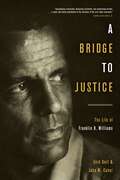
A Bridge to Justice: The Life of Franklin H. Williams
Par Enid Gort, John Caher. 2023
Documents the life of a gifted African American leader whose contributions were pivotal to the movement for social justice and…
racial equalityFranklin Hall Williams was a visionary and trailblazer who devoted his life to the pursuit of civil rights—not through acrimony and violence and hatred but through reason and example. A Bridge to Justice sheds new light on this practical, pragmatic bridge-builder and brilliant, complex individual whose life reflected the opportunities and constraints of an intellectually elite Black man in the twentieth century.Franklin H. Williams was considered a “bridge” figure, someone whose position outside the limelight allowed him to navigate both Black and white circles, span the more turbulent racial waters below, and persuade people to see the world in a new way. During his prolific lifetime, he was a civil rights leader, lawyer, diplomat, organizer of the Peace Corps, United Nations representative, foundation president, and associate of Thurgood Marshall on some of the seminal civil liberties cases of the past hundred years, though their relationship was so fraught with tension that Marshall had Williams sent to California. He worked in the Kennedy and Johnson administrations, served as a diplomat, and became an exceptionally persuasive advocate for civil rights. Even after enduring the segregated Army, suffering cruel discrimination, and barely escaping a murderous lynch mob eager to make him pay for zealously representing three innocent Black men falsely accused of rape, Franklin was not a hater. He believed that Americans, in general, were good people who were open to reason and, in their hearts, sympathetic to fairness and justice.Dr. Enid Gort, an anthropologist and Africanist who conducted hundreds of hours of exclusive interviews with Williams, his family, friends, colleagues, and compatriots, and John M. Caher, a professional writer and legal journalist, have co-written an exhaustively researched and scrupulously documented account of this civil rights champion’s life and impact. His story is an object lesson to help this nation heal and advance through unity rather than tribalism.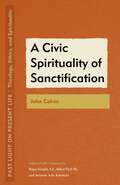
This volume presents the spirituality of John Calvin in three short texts drawn from his Institutes of the Christian Religion.…
Many consider Calvin the most influential thinker of the sixteenth century. His ideas flowed from Geneva into northern Europe, to the English-speaking lands of Britain, and through the Puritans to North America. The prolific writings of Calvin across several genres open up many aspects of Christian living, and each one offers an entrée to his spirituality. On the supposition that “spirituality” refers to the way people or groups lead their lives in relation to ultimacy, three texts have been chosen to form the axis for this interpretation of Calvin’s contribution. These texts deal with his theological view of law, a definition of sanctification, and a short treatise on the Christian life. The portrait of Calvin’s spirituality that emerges from these texts and the larger framework of his theology, his ecclesiology, and his career as church leader and civic organizer can be summarized in the following phrase: a practical spirituality of sanctification by participation in society. One cannot find all of that in these texts, but they establish a platform on which the pieces fall into place. The story of his early life and formation, along with several key ideas that characterize the man and his vision, will help to draw a sharper, more distinctive picture of at least this influential aspect of Calvin’s spirituality. It is one that bears direct relevance, with appropriate adjustments, to life today.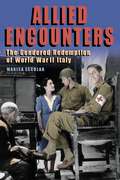
Honorable Mention for the 2019 American Association for Italian American Book Prize (20-21st Centuries)Allied Encounters uniquely explores Anglo-American and Italian…
literary, cinematic, and military representations of World War II Italy in order to trace, critique, and move beyond the gendered paradigm of redemption that has conditioned understandings of the Allied–Italian encounter. The arrival of the Allies’ global forces in an Italy torn by civil war brought together populations that had long mythologized one another, yet “liberation” did not prove to be the happy ending touted by official rhetoric. Instead of a “honeymoon,” the Allied–Italian encounter in cities such as Naples and Rome appeared to be a lurid affair, where the black market reigned supreme and prostitution was the norm. Informed by the historical context as well as by their respective traditions, these texts become more than mirrors of the encounter or generic allegories. Instead, they are sites in which to explore repressed traumas that inform how the occupation unfolded and is remembered, including the Holocaust, the American Civil War, and European colonialism, as well as individual traumatic events like the massacre of the Fosse Ardeatine and the mass civilian rape near Rome by colonial soldiers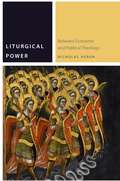
Liturgical Power: Between Economic and Political Theology (Commonalities)
Par Nicholas Heron. 2018
Is Christianity exclusively a religious phenomenon, which must separate itself from all things political, or do its concepts actually underpin…
secular politics? To this question, which animated the twentieth-century debate on political theology, Liturgical Power advances a third alternative. Christian anti-politics, Heron contends, entails its own distinct conception of politics. Yet this politics, he argues, assumes the form of what today we call “administration,” but which the ancients termed “economics.” The book’s principal aim is thus genealogical: it seeks to understand our current conception of government in light of an important but rarely acknowledged transformation in the idea of politics brought about by Christianity.This transformation in the idea of politics precipitates in turn a concurrent shift in the organization of power; an organization whose determining principle, Heron contends, is liturgy—understood in the broad sense as “public service.” Whereas until now only liturgy’s acclamatory dimension has made the concept available for political theory, Heron positions it more broadly as a technique of governance. What Christianity has bequeathed to political thought and forms, he argues, is thus a paradoxical technology of power that is grounded uniquely in service.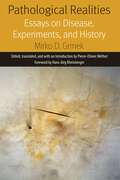
Pathological Realities: Essays on Disease, Experiments, and History (Forms of Living)
Par Mirko Grmek. 2019
Mirko D. Grmek (1924-2000) is one of the most significant figures in the history of medicine, and has long been…
considered a pioneer of the field. The singular trajectory that took Grmek from Yugoslavia to the academic culture of post-war France placed him at the crossroads of different intellectual trends and made him an influential figure during the second half of the twentieth century. Yet, scholars have rarely attempted to articulate his distinctive vision of the history of science and medicine with all its tensions, contradictions, and ambiguities. This volume brings together and publishes for the first time in English a range of Grmek’s writings, providing a portrait of his entire career as a historian of science and an engaged intellectual figure. Pathological Realities pieces together Grmek’s scholarship that reveals the interconnections of diseases, societies, and medical theories.Straddling the sciences and the humanities, Grmek crafted significant new concepts and methods to engage with contemporary social problems such as wars, genocides and pandemics. Uniting some major strands of his published work that are still dispersed or simply unknown, this volume covers the deep epistemological changes in historical conceptions of disease as well as major advances within the life sciences and their historiography. Opening with a classic essay – “Preliminaries for a Historical Study of Diseases,” this volume introduces Grmek’s notions of “pathocenosis” and “emerging infections,” illustrating them with historical and contemporary cases. Pathological Realities also showcases Grmek’s pioneering approach to the history of science and medicine using laboratory notebooks as well as his original work on biological thought and the role of ideologies and myths in the history of science. The essays assembled here reveal Grmek’s significant influence and continued relevance for current research in the history of medicine and biology, medical humanities, science studies, and the philosophy of science.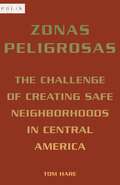
Zonas Peligrosas: The Challenge of Creating Safe Neighborhoods in Central America examines indicators of orderliness and security in El Salvador,…
shows how policies and programs based on disorganization theory have been used, and why they might not make Salvadoran urban dwellers safer. In Latin America, these prescriptions form the basis for what has become known as “citizen security” policy. Just as in disorganization theory, citizen security emphasizes strong social cohesion and expectations for action on the part of neighbors and civil society. Mimicking the methodology of disorganization theorists from the Chicago School, Tom Hare conducted four neighborhood studies in the San Salvador metropolitan area. Mixed methods, including two hundred original survey-interviews, were used to create a rich description of each case. The cases were selected in order to compare and contrast the social order in neighborhoods with varying levels of security and physical and demographic makeup.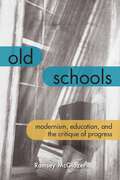
Old Schools: Modernism, Education, and the Critique of Progress (Lit Z)
Par Ramsey McGlazer. 2020
Winner: AAIS First Book PrizeOld Schools marks out a modernist countertradition. The book makes sense of an apparent anachronism in…
twentieth-century literature and cinema: a fascination with outmoded, paradigmatically pre-modern educational forms that persists long after they are displaced in progressive pedagogical theories.Advocates of progressive education turned against Latin in particular. The dead language—taught through time-tested means including memorization, recitation, copying out, and other forms of repetition and recall—needed to be updated or eliminated, reformers argued, so that students could breathe free and become modern, achieving a break with convention and constraint. Yet McGlazer’s remarkable book reminds us that progressive education was championed not only by political progressives, but also by Fascists in Italy, where it was an object of Gramsci’s critique. Building on Gramsci’s pages on the Latin class, McGlazer shows how figures in various cultural vanguards, from Victorian Britain to 1970s Brazil, returned to and reimagined the old school.Strikingly, the works that McGlazer considers valorize this school’s outmoded techniques even at their most cumbersome and conventional. Like the Latin class to which they return, these works produce constraints that feel limiting but that, by virtue of that limitation, invite valuable resistance. As they turn grammar drills into verse and repetitious lectures into voiceovers, they find unlikely resources for critique in the very practices that progressive reformers sought to clear away.Registering the past’s persistence even while they respond to the mounting pressures of modernization, writers and filmmakers from Pater to Joyce to Pasolini retain what might look like retrograde attachments—to tradition, transmission, scholastic rites, and repetitive forms. But the counter-progressive pedagogies that they devise repeat the past to increasingly radical effect. Old Schools teaches us that this kind of repetition can enable the change that it might seem to impede.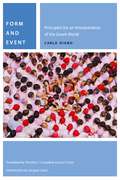
Form and Event: Principles for an Interpretation of the Greek World (Commonalities)
Par Carlo Diano. 2020
Carlo Diano’s Form and Event has long been known in Europe as a major work not only for classical studies…
but even more for contemporary philosophy. Already available in Italian, French, Spanish, and Greek, it appears here in English for the first time, with a substantial Introduction by Jacques Lezra that situates the book in the genealogy of modern political philosophy.Form and Event reads the two classical categories of its title phenomenologically across Aristotle, the Stoics, and especially Homer. By aligning Achilles with form and Odysseus with event, Diano links event to embodied and situated subjective experience that simultaneously finds its expression in a form that objectifies that experience. Form and event do not exist other than as abstractions for Diano but they do come together in an intermingling that Diano refers to as the “eventic form.” On Diano’s reading, eventic forms interweave subjectively situated and embodied experiences, observable in all domains of human and nonhuman life.A stunning interpretation of Greek antiquity that continues to resonate since its publication in 1952, Form and Event anticipates the work of such French and Italian post-war thinkers as Gilles Deleuze, Alain Badiou, Roberto Esposito, and Giorgio Agamben.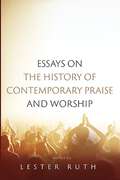
Essays on the History of Contemporary Praise and Worship
Par Lester Ruth. 2020
Seeking to push the historical study of the liturgical phenomenon known as “Contemporary Worship” or “Praise and Worship” to a…
new level, this collection of essays offers an introduction to the phenomenon, documents critical aspects of its development, and suggests methods for future historical study. This multi-authored work investigates topics in both the Pentecostal and mainline branches of this way of worship, looking at subjects little explored by prior work. The provocative issues explored include Integrity Hosanna! Music, James White, charismatic renewal, John Wimber, the development of second services, Black Gospel, overlooked (non-white) sources of worship music, degree programs for worship leaders, and Robert Webber.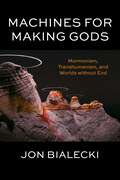
Machines for Making Gods: Mormonism, Transhumanism, and Worlds without End
Par Jon Bialecki. 2022
The Mormon faith may seem so different from aspirations to transcend the human through technological means that it is hard…
to imagine how these two concerns could even exist alongside one another, let alone serve together as the joint impetus for a social movement. Machines for Making Gods investigates the tensions between science and religion through which an imaginative group of young Mormons and ex-Mormons have found new ways of understanding the world.The Mormon Transhumanist Association (MTA) believes that God intended humanity to achieve Mormonism’s promise of theosis through imminent technological advances. Drawing on a nineteenth-century Mormon tradition of religious speculation to reimagine Mormon eschatological hopes as near-future technological possibilities, they envision such current and possible advances as cryonic preservation, computer simulation, and quantum archeology as paving the way for the resurrection of the dead, the creation of worlds without end, and promise of undergoing theosis—of becoming a god. Addressing the role of speculation in the anthropology of religion, Machines for Making Gods undoes debates about secular transhumanism’s relation to religion by highlighting the differences an explicitly religious transhumanism makes.Charting the conflicts and resonances between secular transhumanism and Mormonism, Bialecki shows how religious speculation has opened up imaginative horizons to give birth to new forms of Mormonism, including a particular progressive branch of the faith and even such formations as queer polygamy. The book also reveals how the MTA’s speculative account of God and technology together has helped to forestall some of the social pressure that comes with apostasy in much of the Mormon Intermountain West.A fascinating ethnography of a group with much to say about crucial junctures of modern culture, Machines for Making Gods illustrates how the scientific imagination can be better understood when viewed through anthropological accounts of myth.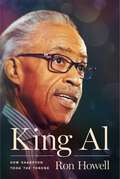
King Al: How Sharpton Took the Throne
Par Ron Howell. 2021
The incredible story of the man and legend who has come to symbolize the continuing pursuit of justice for Blacks…
in the United StatesThrough the 1980s, the mainstream press portrayed the Reverend Al Sharpton as a buffoon, a fake minister, a hustler, an opportunist, a demagogue, a race traitor, and an anti-Semite. Today, Sharpton occupies a throne that would have shocked the white newspaper reporters who covered him forty years ago. A mesmerizing story of astounding transformation, craftiness, and survival, King Al follows Reverend Sharpton’s life trajectory, from his early life as a boy preacher to his present moment as the most popular Black American activist/minister/cable news host.In the 1980s, Rev. Al created controversies that would have doomed a lesser man to the dustbin of history. Among these controversies were his work with the FBI as the agency attempted to locate Black Liberation Army leader Assata Shakur; and his involvement in the 1987 Tawana Brawley episode. Regarding the Brawley matter, a white prosecutor sued Sharpton, successfully, for falsely accusing him of having raped the then-fifteen-year-old Brawley.It was the white press, in its glory days, that created the podium from which Sharpton became both famous and infamous. Those reporters would joke that the most dangerous place in New York was between Al Sharpton and a television camera. But it was those reporters who made Sharpton the media figure he is today.Today, as host of MSNBC’s PoliticsNation news program, Sharpton has more news viewers than those reporters ever had readers.The Reverend Al’s rise to respectability is a testament to an endurance and boldness steeped in Black American history. Born in Brooklyn to parents from the old slave-holding South, he transformed himself into one of the most respected and politically influential Blacks in the United States.In his in-depth coverage, author Ron Howell tells the stories of Sharpton’s ascendance to the throne. He tells us about the glory years of American newspapers, when Sharpton began his rise. And he tells us about the politicians who intersected with Sharpton as he climbed the ladder.King Al is an engaging read about the late-twentieth-century history of New York City politics and race relations, as well as about the remarkable staying power of the colorful, politically skillful, and enigmatic Sharpton.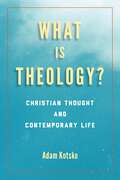
The secular world may have thought it was done with theology, but theology was not done with it. Recent decades…
have seen a resurgence of religion on the social and political scene, which have driven thinkers across many disciplines to grapple with the Christian theological inheritance of the modern world. Adam Kotsko provides a unique guide to this fraught terrain. The title essay establishes a fresh and unexpected redefinition of theology and its complex and often polemical relationship with its sister discipline of philosophy. Subsequent essays build on this framework from three different perspectives. In the first part, Kotsko demonstrates the continued vibrancy of Christian theology as a creative and constructive pursuit outside the walls of the church, showing that theological concepts can underwrite a powerful critique of the modern world. The second approaches Christian theology from the perspective of a range of contemporary philosophers, showing how philosophical thought is drawn to theology even despite itself. The concluding section is devoted to the unexpected theological roots of the modern world-system, making a case that the interplay of state and economy and the structure of modern racial oppression both build on theological patterns of thought.Kotsko’s book ultimately shows that theology is not a scholarly game or an edifying spiritual discipline, but a world-shaping force of great power. Lives are at stake when we do theology—and if we don’t do it, someone else will.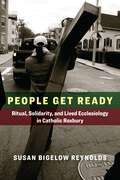
People Get Ready: Ritual, Solidarity, and Lived Ecclesiology in Catholic Roxbury (Catholic Practice in the Americas)
Par Susan Bigelow Reynolds. 2023
WINNER, COLLEGE THEOLOGY SOCIETY 2024 BEST BOOK AWARDWhat does it mean to be a community of difference?St. Mary of the…
Angels is a tiny underground Catholic parish in the heart of Boston’s Egleston Square. More than a century of local, national, and international migrations has shaped and reshaped the neighborhood, transforming streets into borderlines and the parish into a waystation. Today, the church sustains a community of Black, Caribbean, Latin American, and Euro-American parishioners from Roxbury and beyond. In People Get Ready, Susan Reynolds draws on six years of ethnographic research to examine embodied ritual as a site of radical solidarity in the local church. Weaving together archived letters, oral histories, stories, photographs, newspaper articles, and newly examined archdiocesan documents, Reynolds traces how the people of St. Mary’s constructed rituals of solidarity as a practical foundation for building bridges across difference. She looks beyond liturgy to unexpected places, from Mass announcements to parish council meetings, from the Good Friday Via Crucis through neighborhood streets to protests staged in and around the church in the wake of Boston’s 2004 parish shutdowns. Through ethnography and Catholic ecclesiology, Reynolds argues for a retrieval of Vatican II’s notion of ecclesial solidarity as a basis for the mission of the local church in an age of migration, displacement, and change.It is through the work of ritual, the story of St. Mary’s reveals, that we learn to negotiate the borders in our midst—to cultivate friendships, exercise power, build peace, and, in a real way, to survive.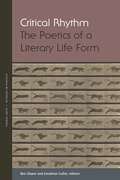
Critical Rhythm: The Poetics of a Literary Life Form (Verbal Arts: Studies in Poetics)
Par Ben Glaser and Jonathan Culler. 2019
This book shows how rhythm constitutes an untapped resource for understanding poetry. Intervening in recent debates over formalism, historicism, and…
poetics, the authors show how rhythm is at once a defamiliarizing aesthetic force and an unstable concept. Distinct from the related terms to which it’s often assimilated—scansion, prosody, meter—rhythm makes legible a range of ways poetry affects us that cannot be parsed through the traditional resources of poetic theory.Rhythm has rich but also problematic roots in still-lingering nineteenth-century notions of primitive, oral, communal, and sometimes racialized poetics. But there are reasons to understand and even embrace its seductions, including its resistance to lyrical voice and even identity. Through exploration of rhythm’s genealogies and present critical debates, the essays consistently warn against taking rhythm to be a given form offering ready-made resources for interpretation. Pressing beyond poetry handbooks’ isolated descriptions of technique or inductive declarations of what rhythm “is,” the essays ask what it means to think rhythm.Rhythm, the contributors show, happens relative to the body, on the one hand, and to language, on the other—two categories that are distinct from the literary, the mode through which poetics has tended to be analyzed. Beyond articulating what rhythm does to poetry, the contributors undertake a genealogical and theoretical analysis of how rhythm as a human experience has come to be articulated through poetry and poetics. The resulting work helps us better understand poetry both on its own terms and in its continuities with other experiences and other arts.Contributors: Derek Attridge, Tom Cable, Jonathan Culler, Natalie Gerber, Ben Glaser, Virginia Jackson, Simon Jarvis, Ewan Jones, Erin Kappeler, Meredith Martin, David Nowell Smith, Yopie Prins, Haun Saussy